We are pleased to introduce to you Indiana pro-life leaders under 40 who are making a big impact in our state. We hope you are encouraged by this new wave of leaders passionate about protecting life!
Indiana’s Young Leaders Spotlight: Courtney Milbank
Pro-life Attorney and Mom Fighting for Life in a Post-Roe America
Courtney Turner Milbank was raised to stand up for what she believes in.
Her father, former State Representative P. Eric Turner, had served in the Indiana legislature from the time Milbank was six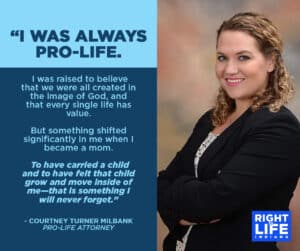
Among those values was the sanctity of human life. In his role, Rep. Turner helped usher pro-life measures through the statehouse, making Indiana a more protective state for unborn babies.
Today, his daughter is playing her own role in that work, serving as general counsel for Indiana Right to Life and has helped draft pro-life legislation on a national scale.
Last summer, she testified in support of pro-life legislation in both South Carolina and Indiana. Both states ended up enacting stronger pro-life laws. Today, Milbank’s father continues to send her articles on the laws which she had a hand in crafting.
“He’s just super proud and very involved and caring about what I do now,” she said. “But it’s absolutely from the legacy he established.”

Milbank had a family to think about. She asked her husband what he thought.
“He and I decided together that I couldn’t not do it,” she said. “If I’m scared to stand up for what I believe, then who would stand up for what we believe in?”
Milbank’s resolve to testify in favor of the legislation matches her resolve to continue the pro-life fight in a post-Roe America.
“What pro-lifers need to know and remember is that the fight is not over,” she said. “The fight has simply changed. We have significant opportunities under Dobbs, and we want to give that ruling the deference it deserves, but now, the fight continues.”
For Milbank, that fight continues in her professional life, but also in the personal life she leads at home. As a wife, mother of three, and an attorney, she balances responsibilities and passions that many in our culture would say don’t belong together.
“I think one of the big things that is pushed on women is this idea that you cannot be successful and have a child—that you have to choose one or the other,” she said. “But I want women to know that’s not true. You can be successful, you can have a career, and you can be a mom—having a child is not a hindrance or a roadblock.”
In fact, Milbank says that bearing and raising her children has given her special insight into the cause for which she is fighting.
“I was always pro-life,” she said. “I was raised to believe that we were all created in the image of God, and that every single life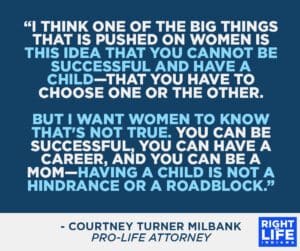
Spreading that sense of awe and respect for the value of human life all across America has been the hope of the pro-life movement—before Roe was overturned and now. As Milbank focuses her attention on how to save more unborn children in a post-Roe America, she stressed the importance of encouraging a pro-life culture in each of the states.
“At this point, we have to continue to help states become more and more pro-life,” she said. “To pass the most pro-life legislation that we are able to and to have the right sort of enforcement mechanisms in place to enforce those laws. We have to keep moving forward because we have to continue fighting for these children.”
Milbank says she will continue using the talents God has blessed her with in the service of that mission.
“I’ve worked very hard in my career, and I’ve worked very hard as a mom, and I experience immense joy from both of those simultaneously,” she said. “We all have a unique set of skills and talents, and I know that God has given me my skills and talents to use in the legal field. And I enjoy experiencing success in my career. But being a mom does not preclude me from using my gifts or experiencing success. I may have to get a little more creative to balance it all, but being both an attorney and a mom is such a blessing,” she continued. “I think it’s important that we each use our own unique skills and gifts to further the pro-life movement and to work where God has called us.”
Notes: This is part of a series on Indiana’s up-and-coming pro-life leaders. Stay tuned for more stories about young leaders who are paving the way for a pro-life future.
Indiana’s Young Leaders Spotlight: Zach Rodgers
The Post-Klopfer Era: Pro-life Leader Strategizes for Pro-life Future in Fort Wayne, Indiana
Zach Rodgers stepped into his new role at Right to Life of Northeast Indiana at a unique moment in pro-life history.
It was January 2020 and Fort Wayne’s pro-life efforts were firing on all cylinders since the discovery of the remains of 2,411 unborn children at the family home of local abortionist, Ulrich Klopfer.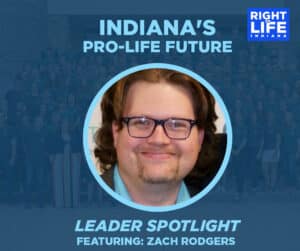
Klopfer, who had been practicing in Indiana since 1979, had died in September 2019. With his death came the disturbing discovery. The story rattled investigators and made national headlines as leaders, reporters, and talking heads tried to make sense of the findings.
Rodgers entered the role of director of development at Right to Life of Northeast Indiana on the heels of the discovery, ready to raise funds for the organization’s education and advocacy efforts. Right to Life of Northeast Indiana had been following the activities of Ulrich Klopfer for years. Founded around a kitchen table in 1982, the group did eventually locate itself right next door to Klopfer’s Fort Wayne abortion center.
Over the years, Right to Life of Northeast Indiana’s founder would see women coming and going from Klopfer’s center. The sobering visual of woman after woman passing through his doors provided a steady fuel for her mission.
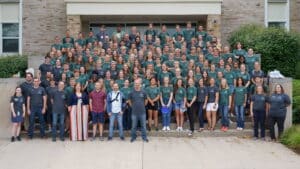
“We moved over to this new location, trusting that God was providing the resources,” Rodgers said. Now, he says his team is halfway through a capital campaign to buy the property from the generous donors who currently rent it out to Right to Life of Northeast Indiana.
Rodgers says the location enables volunteers to reach out to women outside of the facility. For although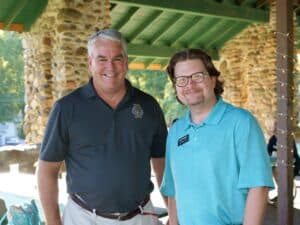
Directing outreach like this is somewhat new and somewhat familiar to Rodgers, who has experience in politics as the owner of a campaign management company and the chief lobbyist for a consulting firm that he co-owned. He says that volunteer outreach at Planned Parenthood can be challenging because it is difficult to know who might be there for abortion information.
“If they’re going in for the prep for an abortion, they’re probably embarrassed or ashamed or scared or all of the above,” he said. “So, we never really, truly know—which is also one of the harder parts in our line of work—is that when we get a ‘save,’ we may never actually know it.”
As a conservative and a Christian, Rodgers says he has always been pro-life. But it wasn’t until he really started learning about the work of Right to Life of Northeast Indiana, that his passion for the cause ignited.
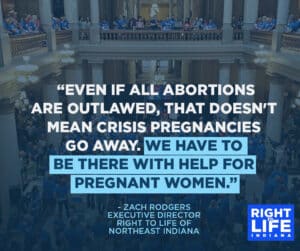
“The other part was seeing people serious about this issue.”
Now, Rodgers is throwing sunlight on all the life issues, hoping to make more people serious about the pro-life cause. Along with volunteer outreach, Rodgers says Right to Life of Northeast Indiana has a strong education focus. One staff member’s job is to bring lessons on fetal development and pro-life apologetics into Christian classrooms.
All the while, Right to Life of Northeast Indiana continues to grow. The organization currently comprises Adams, Allen, Dekalb, Huntington, LaGrange, Noble, Steuben and Wells counties. With such a large territory, Rodgers says he is continually in need of volunteers to serve as go-betweens for the organization and churches.
Since the fall of Klopfer and the overturning of Roe v. Wade last summer, Rodgers says it’s more important for pro-lifers to be involved with our movement than ever.
“This is the danger in the movement—even if all abortions are outlawed, that doesn’t mean crisis pregnancies go away,” he said. “We have to be there with help for pregnant women.”
Indiana’s Young Leaders Spotlight: Antonio Marchi
Antonio Marchi was a high school student, working a part-time job at a local pizza joint when his pro-life values came into full focus. 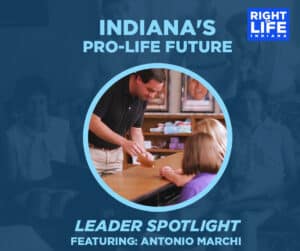
But when they learned that their unborn baby had anencephaly, their outlook dimmed.
Anencephaly is a neural tube defect in which the baby is born without parts of the brain and skull. Babies who are born with anencephaly usually live a few hours to days before dying. The diagnosis is often cited among conditions for which abortion should be legal.
Antonio’s co-worker and her husband were heartbroken by the news. But Antonio watched as the mother bravely and lovingly continued her pregnancy.

She eventually gave birth, and she and her husband had the opportunity to hold and love their baby before the child passed away.
Antonio’s witness to the love of that mother and father was a watershed moment in his life. Across the years, Antonio would hold onto their example of selfless love as one of the underpinnings for his pro-life convictions.
Today, Antonio serves as the executive director of Right to Life Michiana, where he advocates for the lives of unborn children and connects mothers in need to helpful resources.
He has been involved with Right to Life Michiana as a member of its staff and board since graduating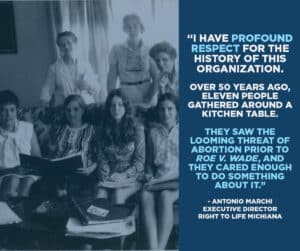
His first day in the role was June 24, 2022—the day the Supreme Court released its decision in Dobbs v. Jackson Whole Women’s Health Organization, thereby overturning Roe v. Wade.
Since that day, Antonio says the organization has been re-strategizing for the future. While assisting abortion-vulnerable women has been a longtime priority for the organization, he says Right to Life of Michiana is taking that priority to another level this year. Very soon, the group is expected to launch a mobile unit for, HerMichiana, an initiative that connects women to more than 200 resources.
Antonio says the Right to Life Michiana team regularly receives calls from expectant women in difficult situations. For a long time, the hope has been to walk alongside such women more directly. The group’s future mobile unit will allow it to do just that.
“By expanding the HerMichiana project, we hope to increase the level of personal care we share with women and to empower the community with the vast network of resources available here,” he said. “As the landscape changes post-Roe, where the threats go, the HerMichiana mobile unit will follow and meet abortion-vulnerable women with loving alternatives.”
As exciting as this development is, Antonio says this is just one of many projects Right to Life Michiana has in the works. The organization has a strong focus on public education, training pro-life advocates, and keeping tabs on developments across all pro-life issues, including physician assisted suicide.
But even as Right to Life Michiana grows and re-strategizes, Antonio sees a continuity in the work the organization began a half century ago.
“I have profound respect for the history of this organization,” he said. “Over 50 years ago, eleven people gathered around a kitchen table. They saw the looming threat of abortion prior to Roe v. Wade, and they cared enough to do something about it. Now that Roe v. Wade is overturned, the challenges have shifted, but our determination has not. In many ways, I feel that we are joining our predecessors back around the table to strategize, double down, and make the hard sacrifices it takes to fight for our most precious gift.”
Notes: This is part of a series on Indiana’s up-and-coming pro-life leaders. Stay tuned for more stories about young leaders who are paving the way for a pro-life future.
For help with a fatal prenatal diagnosis, such as anencephaly, please visit perinatalhospice.org.
Indiana’s Young Leaders Spotlight: Mary Carmen Zakrajsek

Mary Carmen didn’t weep because she didn’t believe Roe would be overturned. Hers were tears of joy. “I know a lot of people said that they never thought they’d live to see the day,” she said. “That kinda shocked me. Because we have to believe that things like this are possible. We have to believe that we actually can reverse this egregious decision.”
It’s that kind of determination that has been driving Mary Carmen Zakrajsek for a little over a decade. Today, she serves as Indiana and Michigan’s regional coordinator for Students for Life of America. But years ago, she was a seventh-grade student who had just learned about fetal development and what really happens during an abortion.
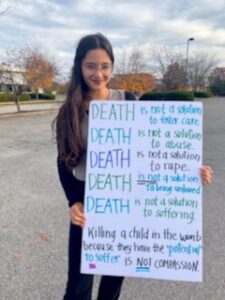
Mary Carmen attended her first March for Life with a group from her church when she was in the ninth grade. In her sophomore year, she joined a club at her school called “Teens for Life.” The following year, she became the group’s co-president, and in her senior year, she became the group’s sole president and earned a place in Students for Life of America’s Thaddeus Stevens Leadership Fellowship. That same year, Mary Carmen faced blowback for her advocacy when her school administration tore down her group’s pro-life posters in the school cafeteria. Mary Carmen pushed back against the action as a violation of her group’s First Amendment rights. With the help of Liberty Counsel, she threatened legal action until the administration finally backed down and allowed her group to post their signs.

It has challenged her to be fast-moving in her efforts to activate students—especially since the overturning of Roe.
“We can’t let people think our work is done,” she said. “We have the responsibility of a lifetime. The reversal of Roe–that was not my victory or my generation’s victory. I think that was really the hard work of the generation before us. That was the victory of our parents, our grandparents. We’re so grateful for their dedication and their work and their influence in sparking our courage and our passion. And so, for our battle right now, our victory is ensuring that abortion is made completely unavailable.”
In Indiana and Michigan, Mary Carmen has already witnessed firsthand how quickly Roe changed the landscape for abortion policies in the U.S. While Indiana sprinted to pass pro-life legislation last summer, a ballot initiative swept through Michigan with the goal of enshrining abortion in the state constitution.
In July, Indiana Governor Eric Holcomb signed legislation to ban most abortions in the state of Indiana. In November, Michigan voters approved the pro-abortion ballot initiative, Proposition 3, after abortion activists poured $35 million in funding into the effort.
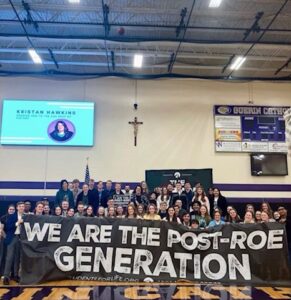
But the loss in Michigan isn’t slowing Mary Carmen down.
“The pro-life movement isn’t going to give up just after one election,” she said. “The pro-life movement isn’t going to, because a number of months passed after the Dobbs decision, and we didn’t outlaw abortion completely. You know, it takes time and prayer and sacrifice. If anything, in the case of Michigan, I think it just proves to the movement that there’s never been a more pivotal time than now.”
Coming soon in our young leaders spotlight… Antonio Marchi.
”

Recent Comments